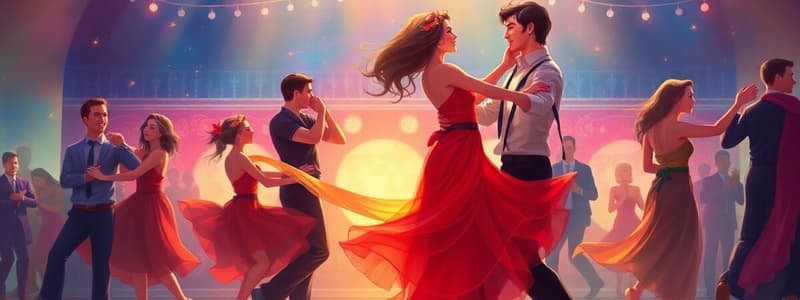Podcast
Questions and Answers
What is the primary purpose of social dances?
What is the primary purpose of social dances?
- To provide a platform for professional dancers only
- To facilitate group participation and enjoyment (correct)
- To focus on technical skills over personal expression
- To promote solo performances and competition
Which dance is characterized by a close hold and a low center of gravity?
Which dance is characterized by a close hold and a low center of gravity?
- Rumba
- Quickstep
- Cha-Cha-Cha
- Tango (correct)
What is a key physical benefit of dancing?
What is a key physical benefit of dancing?
- Increases oxygen flow in the body (correct)
- Develops culinary skills
- Enhances auditory skills
- Improves reading comprehension
Which dance style is known for its sassy and smooth demeanor?
Which dance style is known for its sassy and smooth demeanor?
Which term describes the expressive hip movement in dance achieved through knee motions?
Which term describes the expressive hip movement in dance achieved through knee motions?
What is the distinguishing feature of the Samba dance?
What is the distinguishing feature of the Samba dance?
What is a common characteristic of the Quickstep dance?
What is a common characteristic of the Quickstep dance?
Which ballroom dance is often referred to as the 'mother of present-day dances'?
Which ballroom dance is often referred to as the 'mother of present-day dances'?
What concept involves the alignment of body segments during dance movements?
What concept involves the alignment of body segments during dance movements?
Which dance does NOT generally involve partnered movements?
Which dance does NOT generally involve partnered movements?
Flashcards
Social Dances
Social Dances
Dance forms for group participation and enjoyment, often with music.
Recreational Ballroom Dancing
Recreational Ballroom Dancing
A fun exercise and emotional outlet; following world trends in dance.
Cha-Cha-Cha
Cha-Cha-Cha
Lively Cuban dance; often used in social dances.
Jive
Jive
Signup and view all the flashcards
Rumba
Rumba
Signup and view all the flashcards
Samba
Samba
Signup and view all the flashcards
Waltz
Waltz
Signup and view all the flashcards
Tango
Tango
Signup and view all the flashcards
Foxtrot
Foxtrot
Signup and view all the flashcards
Line Dance
Line Dance
Signup and view all the flashcards
Study Notes
Dance Forms
- Dance is a fusion of movement, music, space, and communication
- Dance offers various benefits, including improved well-being, community connections, and a healthier lifestyle
- Social dances involve individuals performing together, usually with music, for group participation and enjoyment
- Ballroom dancing, a subset of social dance, gained popularity around World War I in the US, including dances like the Charleston
- Recreational ballroom dancing is a good exercise, fun, and an outlet for emotions
Types of Dances
- Cha-Cha-Cha: A lively dance originating in Cuba after World War II, with African influences, noted for being fun, energetic, and a popular choice for dancers of all backgrounds
- Jive: Energetic dance known for knee-lifting, hip bending, and incorporation of kicks and other fast movements
- Rumba: A sensual dance characterized by a smooth and sassy demeanor, focusing on the connection with a partner
- Samba: An upbeat, lively dance performed counter-clockwise, characterized by hip action, pelvic tilt, and syncopation
- Waltz: A romantic dance, viewed as the foundation of many modern dances, characterized by flowing, round, and rise-and-fall movements
- Tango: A close-hold dance emphasizing a low center of gravity and contra body movement
- Quickstep: A fast-paced dance featuring dynamic, energetic movements, utilizing a staccato feel
- Foxtrot: A dance characterized by slow-quick-quick footwork and smooth motions
- Line Dance: A dance style performed by a line of dancers, following a pre-determined pattern to music
Ballroom Dance Terminology
- Body Lines: Alignment and form of body segments during a dance
- Cha Cha Chasse: A step-close-step dance pattern
- Cuban Motion: A hip movement style emphasizing bending and straightening of the knees, emphasizing weight transfer
- Draw: Pulling one foot along the floor
- Floor Design: The pattern of foot placement on the floor
- Figure: A specific sequence/series of steps
- Footwork: Manner of using feet in a dance
- Open Break: A separation of partners, usually involving the man pushing the woman away while holding her hand.
- Place: Positioning a foot accurately in the desired position.
- Step: A complete weight transfer from one foot to the other.
- Swirl: A pivoting motion done using one or more parts of the foot.
Benefits of Dancing
- Physical Benefits: Strengthens muscles, stimulates senses, improves cardiovascular health
- Mental & Emotional Benefits: Enhances self-confidence, promotes positive attitude, and releases endorphins
Studying That Suits You
Use AI to generate personalized quizzes and flashcards to suit your learning preferences.




